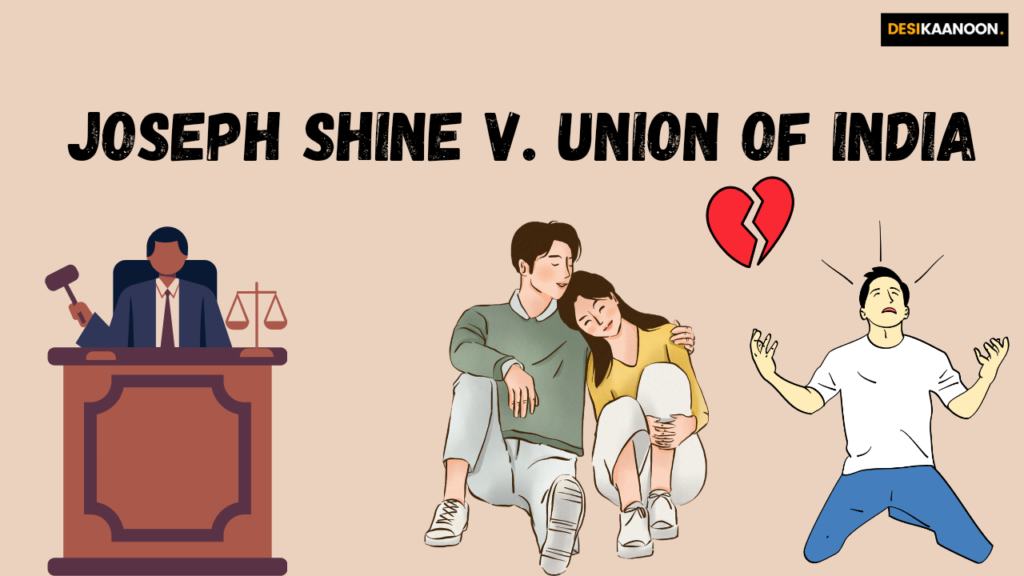Aastha Pareek
Case Name:- Joseph Shine v. Union of India
Case Number:- Writ Petition (Criminal) No. 194 Of 2017
Bench:- Chief Justice Dipak Misra, Justices Rohinton Fali Nariman, A. M. Khanwilkar, Dr. D. Y. Chandrachud, Indu Malhotra
Provisions Involved:- The provisions involved in the Joseph Shine v. Union of India case are:
1. Section 497 of the Indian Penal Code (IPC) – Adultery law (now struck down).
2. Article 14 of the Constitution of India – Right to equality.
3. Article 15 of the Constitution of India – Prohibition of discrimination on grounds of religion, race, caste, sex, or place of birth.
4. Article 21 of the Constitution of India – Right to life and personal liberty.
Background:
Section 497 of the Indian Penal Code (IPC) criminalized adultery. Under this provision, if a man had sexual intercourse with a married woman without her husband’s consent, the man could be punished with up to five years of imprisonment, while the woman could not be prosecuted, as she was considered a victim. The law was based on the assumption that a married woman was the property of her husband and lacked agency in her own sexual choices.
Joseph Shine, an Indian citizen living abroad, filed a Public Interest Litigation (PIL) challenging the constitutional validity of Section 497. His argument centered on the claim that the law discriminated against men and treated women as mere possessions of their husbands, violating fundamental rights such as equality, dignity, and personal liberty.
Facts of the Case:
Joseph Shine, through his PIL, sought to challenge the legality of Section 497 of the IPC, which allowed only the husband of an adulterous woman to file a complaint against the man involved, thereby placing women in a subordinate position. The law did not allow the wife of an adulterous husband to prosecute her husband’s extramarital partner. Shine argued that the law was discriminatory on two levels:
(1) only men could be prosecuted, and
(2) only men could sue for adultery.
The Section also conferred an exclusive right to the husband to decide whether his wife’s extramarital partner could be prosecuted, reinforcing a patriarchal view of marriage.
Issue Raised:
1. Does Section 497 violate Article 14 (Right to Equality) by discriminating based on gender and treating women as the property of their husbands?
2. Does Section 497 violate Article 15 (Prohibition of Discrimination) by discriminating against men and imposing a gender-biased punishment?
3. Does Section 497 infringe on Article 21 (Right to Personal Liberty and Privacy) by interfering with the private choices of individuals, especially within marriage?
4. Does the provision treat women unequally, as it denies them the agency to prosecute their husbands’ extramarital partners, while allowing husbands the right to prosecute their wives’ partners?
Judgment:
The five-judge Bench of the Supreme Court, led by then Chief Justice Dipak Misra, unanimously struck down Section 497 as unconstitutional. The Bench delivered the following key findings:
1. Violation of Article 14: The Court held that Section 497 was discriminatory as it treated women as property and conferred special privileges upon husbands. The law was outdated, based on patriarchal values, and violated the right to equality by treating men and women unequally.
2. Violation of Article 15: The Court found that Section 497 reinforced harmful gender stereotypes, treating women as incapable of making decisions in extramarital relationships. The discriminatory treatment of men and the denial of women’s agency violated the constitutional mandate of non-discrimination.
3. Violation of Article 21: The court recognized that sexual autonomy and decisions within personal relationships are part of the right to personal liberty and privacy. The state, the court ruled, had no right to criminalize consensual relationships between adults. Section 497, therefore, was an unwarranted intrusion into the private lives of individuals.
4. Dignity and Equality of Women: The Court emphasized that the provision was based on outdated and paternalistic views, reducing women to property and denying them equal standing in marriage. Marriage, the court held, must be based on equality and dignity between partners, not on dominance or ownership.
5. Adultery as Grounds for Divorce, Not Criminalization: The Court made it clear that while adultery can be grounds for divorce, it should not be treated as a criminal offense. Adultery is a matter of personal choice and morality, and the criminal law should not intervene in private matters between consenting adults.
Conclusion:
The Supreme Court, in Joseph Shine v. Union of India, decriminalized adultery, striking down Section 497 of the IPC. The judgment was seen as a progressive step toward gender equality and personal liberty. The Apex Court ruled that criminalizing adultery violated constitutional rights such as equality, non-discrimination, and personal liberty, and reaffirmed that marriage should be a partnership of equals.
Click here to access the order.

